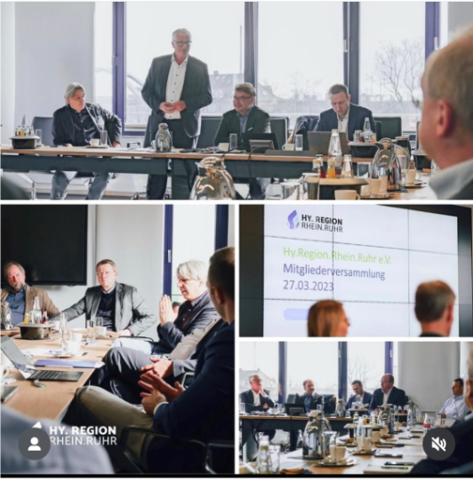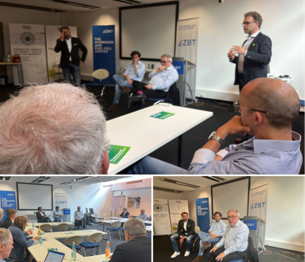Hy Region Rhein Ruhr Association
Implementing decarbonisation projects in partnership
- As part of the international Accelerate GDT project, and a founding member of the Hy.Region.Rhein.Ruhr Association, Duisburg Business and Innovation is driving decarbonisation in Duisburg together with local and transnational partners.
- The EU-funded project is led by Munster University of Technology in Ireland and includes partner organisations from Barcelona, Cork, Turin, Vienna, Budapest, Prague, and Duisburg.
- Hy.Region.Rhein.Ruhr provides a support and exchange forum for its member companies to facilitate an issue-based and project orientated discourse with the final goal of establishing an industrial scale hydrogen economy in Duisburg.
On 20th and 21th of July, international participants have discussed the realignment of regional economic policy as part of the EU's Accelerate GDT project. The project aim is to accelerate the green and digital transformation. This is why Europe is a guest in Duisburg, the city of steel: decarbonisation and digitalisation are being driven forward through European cooperation. These megatrends of the 21st century pose entirely new, very concrete challenges for economy and society. Innovative ideas and new value chains are needed, and they need to be established quickly. The goal: climate neutrality by 2050.
"The decarbonisation of a traditional industrial site is challenging. Approval procedures have to be accompanied, and new production plants have to be built. But above all, a strategy must be developed, that is supported by all stakeholders," says Prof. Dr Rasmus C. Beck, CEO of Duisburg Business and Innovation (DBI). "Accelerate GDT offers the opportunity to present and exchange ideas with European partners facing similar challenges and to jointly develop new solutions," says Beck.
Duisburg’s strengths in the steel and trimodal logistics sectors are the basis for engaging the local stakeholders in a specific and binding manner to facilitate the realisation decarbonisation projects. The Hy.Region.Rhein.Ruhr Association brought actors from the entire hydrogen value chain and science together into a single support and exchange forum. The association acts as the cluster management organisation for Duisburg’s hydrogen cluster. Under that umbrella, projects such as the development of the worldwide first climate-neutral container terminal (Duisburg Gateway Terminal) in Duisburg’s harbour and the development of thyssenkrupp Steel Europe’s direct reduction plant (tkH2Steel) are being developed.
In order to realise decarbonisation projects, a reliable legal and financial framework is needed that gives companies the security to make the multi-million investments. The Hy.Region.Rhein.Ruhr association therefore regularly organises topic-related dialogues between industrial players and political decision-makers at the municipal, state and federal levels to bring the challenges of the industry into the political decision-making process.

As a participant, Dr John Hobbs, Senior Lecturer at Munster University of Technology, is more than enthusiastic about the location: "What really inspires me about Duisburg is the networking of the ecosystem. The engagement with policymakers and stakeholders is also evident. It's great to see the role that the Hy.Region.Rhein.Ruhr Association is playing in the transformation of the region in cooperation with all partners from industry, science, and politics".
The workshop on knowledge-based economic development took place in the Fraunhofer-inHaus-Centre and the city town hall of Duisburg. The exchange between the partner regions highlighted how Duisburg is evolving from a traditional into a progressive economy, driven by renewable energies and hydrogen. Best practice examples from the project partners ranged from changing the mindset of entrepreneurs to deep dives into the innovation ecosystems of cities and regions.
In the next step, the project partners will analyse their state and regional policy environment to lay the foundation for policy improvements to accelerate the green and digital transformation. The first results and conclusions of the project will be presented in a case study and published in mid-2024.

